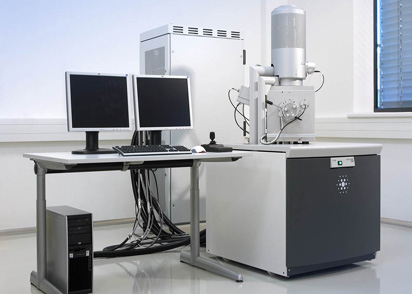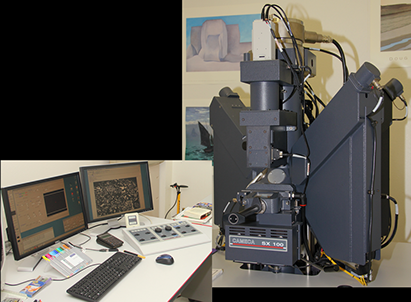Scanning Electron Microscopy (SEM)
The scanning electron microscope (SEM) uses a focused beam of high-energy electrons (called an electron probe) to generate a variety of signals including secondary electrons at the surface of solid specimens. The signals that derive from electron-sample interactions provide topographical information about the sample including surface morphology, chemical composition, and crystalline structure and orientation of materials making up the sample. In most applications, topography of the surface can be observed by two-dimensional scanning of the electron probe over the surface and acquisition of an image from the detected secondary electrons. The SEM is also capable of performing analyses of qualitatively or semi-quantitatively determining chemical compositions when coupled with Energy-dispersive X-ray Spectrometer (EDS). The advantage of the EDS is that the X-rays from a wide range of elements from B to U are analyzed simultaneously.
In our lab, all the solid samples are characterize, before and after chemical process, for bulk and surface properties. Here, SEM data used to extract particle size distributions, shape information and elemental compositions. Through collaborations, we have access to several SEM facilities including,
(a) The Center for Integration Nanotechnologies, Los Alamos
High resolution Scanning Electron Microscopes for imaging nanoparticles. At CINT, two FEI field-emission source SEMs, Nova NanoSEM 450 and Nova 600 Nanolab are accessible that have spatial resolution of 1.1 nm at 15 kV in secondary electron mode.
(b) Bureau of Geology & Mineral Resources, NMT
Electron Microprobe for imaging larger partciles. The Cameca SX-100 microprobe at NMT is equipped with 3 wavelength dispersive (WD) spectrometers, plus secondary electron and high-speed backscattered electron detectors. The WDS spectrometers can be used to conduct quantitative analyses on individually selected points, traverses, and point grids.


ADMINISTRATIVE ASSISTANT
GAYAN R. RUBASINGHEGE
Associate Professor of Chemistry
New Mexico Institute of Mining and Technology
Department of Chemistry
801 Leroy Place
Socorro, NM 87801
Bethany Jessen
New Mexico Institute of Mining and Technology
Department of Chemistry
801 Leroy Place
Socorro, NM 87801
Phone: 575-835-5129
Fax: 575-835-5215
Phone: 575-835-5263
Fax: 575-835-5364
Copyright © 2018 The Environmental Chemistry Research Research Group. All rights reserved.